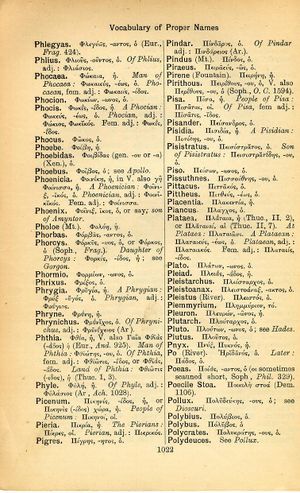Phlegyas: Difference between revisions
From LSJ
ἡδονὴ μὲν γὰρ ἁπάντων ἀλαζονίστατον → pleasure is the greatest of impostors, pleasure is the most shameless thing of all
(D_7) |
(Gf-D_7) |
||
| Line 1: | Line 1: | ||
{{WoodhouseENELnames | {{WoodhouseENELnames | ||
|Text=[[File:woodhouse_1022.jpg|thumb|link= | |Text=[[File:woodhouse_1022.jpg|thumb | ||
|link={{filepath:woodhouse_1022.jpg}}]]Φλεγύας, -αντος, ὁ (Eur., ''Frag.'' 424). | |||
}} | }} | ||
{{Lewis | {{Lewis | ||
Revision as of 07:44, 14 August 2017
English > Greek (Woodhouse)
Φλεγύας, -αντος, ὁ (Eur., Frag. 424).
Latin > English (Lewis & Short)
Phlĕgyas: ae (acc. -an, Val. Fl. 2, 193), m., = Φλεγύας,
I the son of Mars, king of the Lapithœ, and father of Ixion and Coronis, Verg. A. 6, 618 Serv.; Stat. Th. 1, 713.
Latin > French (Gaffiot 2016)
Phlĕgўās, æ, m. (Φλεγύας), fils de Mars, roi des Lapithes, qu’un rocher menace éternellement dans les enfers : Virg. En. 6, 618.

